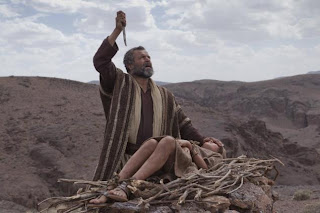An Outsiders' View of 'The Bible'
"We may see more TV for religious believers as a result of [History Channel's] The Bible. What I'd love to see — but am not so sure we will — is more TV about religious believers. Religious faith (or the passionate lack thereof) plays a huge role in billions of people's lives. Primetime TV, however, has a habit of dealing with faithful characters badly or — more often — not at all. … The reason TV series should have religious characters and take them seriously is the same reason they should have racial and cultural diversity: not as an act of charity, not to pander to demographics, but because it makes for better stories. People who believe things are interesting. People wrestling with the big questions are interesting." — James Poniewozik, TV Critic
History Channel's take on "The Bible" has now had three airings, offering 60 percent of its content. So far we've made it through the Old Testament (five hours) and the beginning of the story of Jesus, arguably the most important part of the Bible for non-believers.
Last night, as I made my way through the third piece of the mini-series, I couldn't help but wonder what people who don't believe in the Bible think of this mini-series? What are they taking away from this depiction of the greatest selling book of all time? Are they coming to appreciate the faith in a new way?
I had the opportunity to hear a special presentation from Mark Burnett and Roma Downey — the executive producers of this mini-series — months before it aired. I appreciated their passion and excitement for telling this story. And I also got the sense they saw it as an opportunity for evangelism. So my natural question about what we've seen so far is, does that hold up?
My initial answer is I don't know. As Christians, ones who've been in the faith a while and have become familiar with these Old Testament stories, we probably forget how striking they are. While Christians today seem to break out the protest signs at the first hint of violent or sexual content depicted in mainstream media, we forget that the heart of our faith is a narrative full of R-rated stories. Many of those stories were featured in the first five hours of this labor of love, and many of them are striking.
I, of course, commented on the ways I think some of this violent content has been glamorized. We have seen stylized fighting and some geysers of blood that have little to do with the heart of the Gospel, but that is probably a product of our 21st Century sense of marketing. Still, it's worth asking how these things strike non-believers. Especially given the lack of relative depth afforded to this medium.
In the old days, stories of the Bible were fodder for mainstream entertainment. But while Cecile B. DeMille got four hours to tell the story of Moses, the producers of "The Bible" have 10 hours total for the whole Bible. Still, it's difficult considering the content to figure how non-believers would take this.
If I, who am familiar with the stories, am taken back by the content of this series, how much more would that impact those new to the faith? While I appreciate the ambition of this project, and I wonder how much more powerful the Jesus section will be, it's hard not to think this isn't quite the evangelism tool one would have hoped.




Comments
Post a Comment